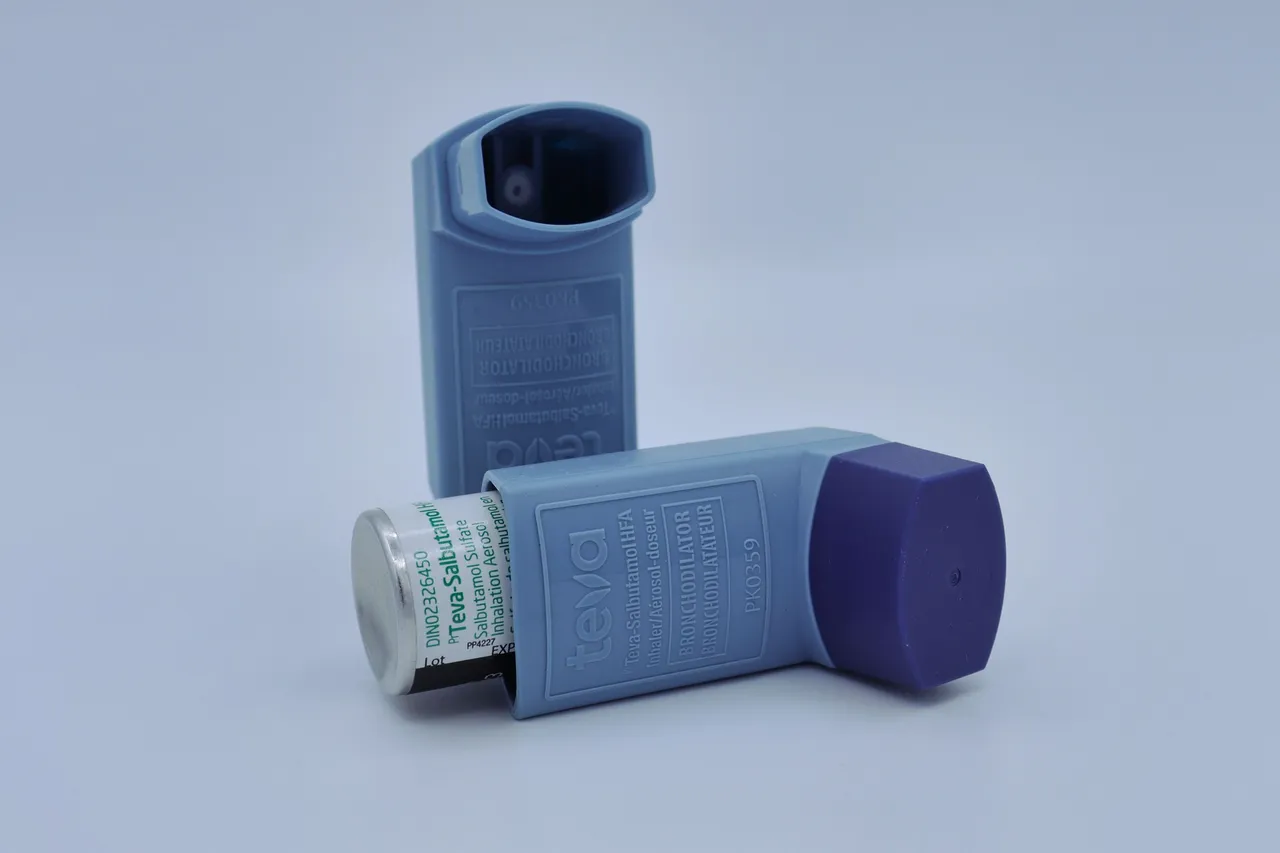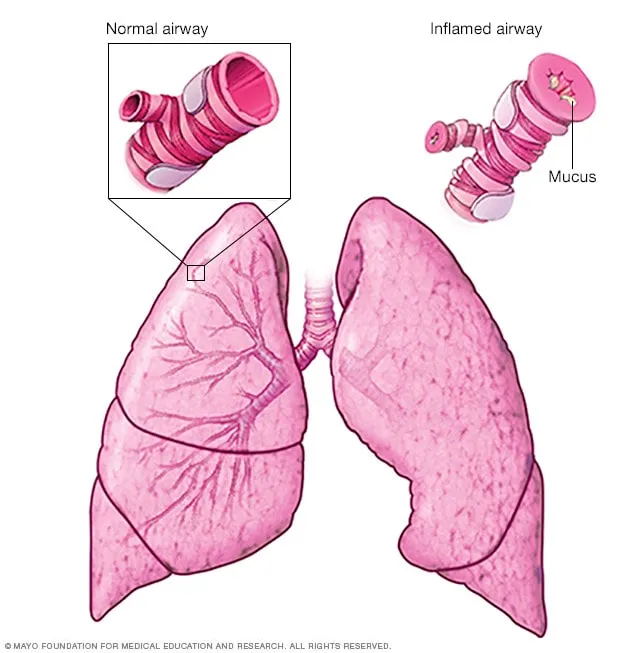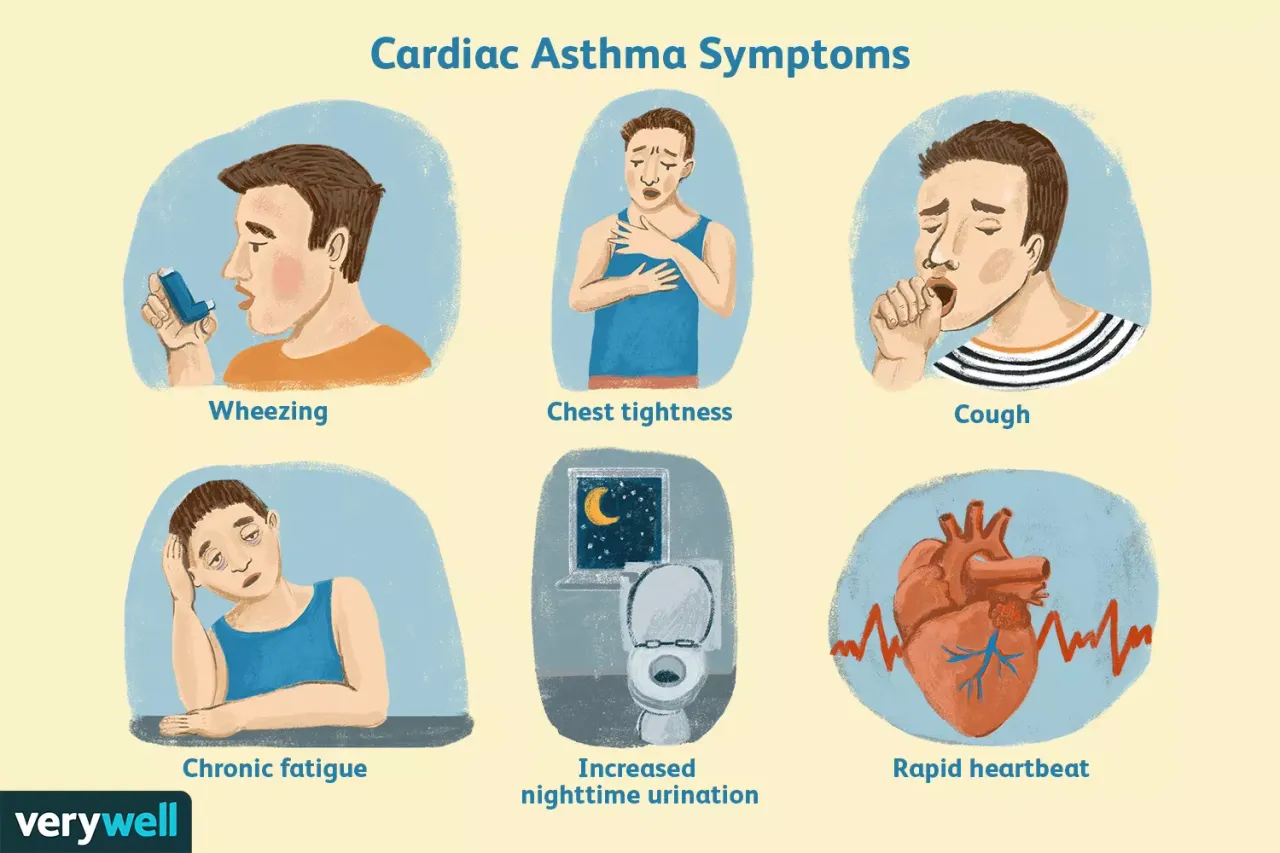
Source
Different types of allergens such as dust-sand, smoke, flower molecules, toxic gases emitted by factories, car fumes, certain foods, medicines etc. cause allergies and asthma.Everyone knows that asthma is a lung disease that affects your ability to breathe. But do you know how it happens, what triggers it, and the different options for treatment? If not, read on. Asthma is common among young adults but can be found in children of almost any age. According to the Asthma and Allergy Foundation of America (AAFA), nearly 25 million Americans are living with asthma. It is one of the most common chronic diseases among youth, and its prevalence continues to grow worldwide. As an asthmatic patient, you need to have a clear understanding of your condition and the best course of action regarding your treatment options. Let’s explore everything you should know about asthma – from its causes and types to its risks and treatment methods.
What is Asthma?
Asthma is a lung disease that affects your ability to breathe. If your airways are swollen and constricted, you will experience shortness of breath, coughing, or wheezing. People with asthma can experience any or all of these symptoms at any time. Infants and children with asthma may have a cough, or they may have difficulty breathing, especially at night. If your asthma is not well managed, it can cause you to miss school or work, use an Emergency Room, and even cause you to be hospitalized. Asthma is most commonly thought of as an allergic reaction in your airways. Airflow in your lungs normally goes through a series of tubes, which lead to smaller tubes called bronchi. The bronchi end in clusters of small sacs called alveoli, which are where the exchange of oxygen and carbon dioxide occurs.

Source
How Does Asthma Happen?
- dust,
- insect spider,
- exercise or physical exertion,
- Certain medicines (eg aspirin, beta blocker
- Emotions (may be due to sadness, fear or joy),
- smoking,
- pets
- colds and viruses,
- Animal hair etc. Asthma can be caused by respiratory syncytial virus invading the airways.
Asthma can be triggered by a wide variety of factors including allergens, certain weather conditions, stress, exercise, or eating certain foods. Once triggered, you may feel shortness of breath, a tightness in your chest, and/or a coughing fit. During an asthma attack, your airways become narrowed or even completely blocked. This happens as a result of inflammation in your airways. Air is transported to your lungs through a series of tubes that are lined with tiny sacs called alveoli. These sacs are what allow your body to exchange carbon dioxide and oxygen. In people who suffer from asthma, the walls of those tubes are inflamed and the sacs swell up, causing the tubes to narrow and become blocked. This makes it more difficult for the lungs to receive oxygen and leads to shortness of breath, coughing, wheezing, and other symptoms. The exact causes of asthma are not known. But researchers have found a number of risk factors that can increase your likelihood of developing asthma. Those include: - Genetics - Exposure to certain allergies or infections - Exposure to air pollution or cigarette smoke - Exposure to certain chemicals or fumes - Having certain disorders
Types of Asthma
There are two types of asthma, allergic and nonallergic. Allergic asthma is triggered by an allergic reaction that leads to inflammation in the airways. Nonallergic asthma is largely due to airway hyper-reactivity (as opposed to allergic asthma which is due to airway hyper-reactivity and the presence of IgE antibodies). Though both allergic and nonallergic asthma can be triggered by allergens, nonallergic asthma is not caused by a person being allergic to a trigger. Rather, nonallergic asthma occurs when a person’s airways become very sensitive and react to air pollutants and other irritants as if they were allergens. Some of the different types of asthma include: - Childhood Asthma - This type of asthma usually happens in early childhood. It often disappears before a child turns 18, but some adults do have childhood asthma. - Adult-Onset Asthma - This type of asthma usually starts after age 18 and may happen at any age. - Exercise-Induced Asthma: This type of asthma happens when your airways get irritated by something in your body. For example, a change in the amount of salt in your blood can irritate your airways and cause asthma symptoms. Exercise can also cause your airways to swell, which may lead to asthma symptoms. - Acute Asthma: This condition is caused by an allergic reaction to something. Symptoms can develop and get worse in a very short time.
Risk Factors for Developing Asthma
If you have asthma, the inside walls of the airways in your lungs can become inflamed and swollen. In addition, membranes in your airway linings may secrete excess mucus. The result is an asthma attack. During an asthma attack, your narrowed airways make it harder to breathe, and you may cough and wheeze.

Source
People with asthma usually have a genetic predisposition toward developing the condition. There is also evidence that environmental factors such as pollutants, diet, and stress can trigger asthma or worsen symptoms. If you’ve been diagnosed with asthma, you can take steps to reduce your risk of developing it in the future. You can do this by avoiding those risk factors that may trigger an asthma attack or make your symptoms worse. - Genetics - You may be more likely to develop asthma if you have a family history of the condition. If one or both of your parents or any of your siblings have asthma, you have a higher risk of developing the condition yourself. - Exposure to certain allergies or infections - If you’ve already been diagnosed with allergies, you may be more likely to develop asthma. The same goes for infections like the flu or bacterial pneumonia. These infections can trigger asthma symptoms. - Exposure to air pollution or cigarette smoke - Air pollution and secondhand smoke have been linked to an increased risk of developing asthma. - Exposure to certain chemicals or fumes - Certain chemicals and fumes may worsen asthma symptoms, including some cleaning products, car exhaust, and paint fumes. - Having certain disorders - If you have diabetes or a thyroid disorder, you may have a higher risk of developing asthma. - Stress - While stress doesn’t directly cause asthma, it can lead to a worsening of asthma symptoms.

Source
Treatments for Asthma
The best way to treat asthma is to avoid triggers and maintain a proper level of vigilance. You can do this by keeping a daily asthma diary, monitoring your symptoms, and taking your medication as prescribed. Effective treatment involves both lifestyle changes and medication. It’s important to seek medical treatment as soon as your asthma symptoms start. And once you’ve been diagnosed with asthma, it’s important to follow your doctor’s advice. You can reduce the risk of asthma getting worse and ensure that your asthma remains under control.
Conclusion
Asthma is a lung disease that affects your ability to breathe. It is triggered by allergies, certain infections, pollution, or stress. It can be treated with lifestyle changes and medication. It is important to keep a daily asthma diary, monitor your symptoms, and take your medication as prescribed to manage your asthma. With proper treatment and vigilance, you can minimize your risk of developing asthma.
Reference:----
https://www.who.int/news-room/fact-sheets/detail/asthma
https://www.mayoclinic.org/diseases-conditions/asthma/symptoms-causes/syc-20369653
https://www.asthma.org.uk/advice/understanding-asthma/types/
This post 5% beneficiary of @stemsocial